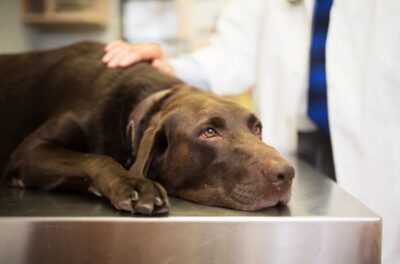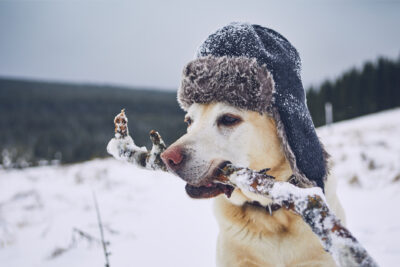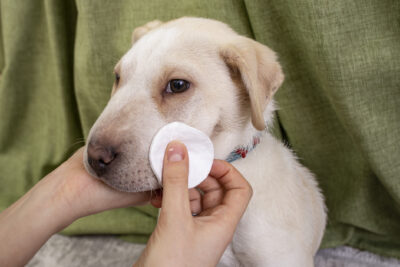Dog Dry Skin: Causes and How to Help

All featured products are chosen at the discretion of the GreatPetCare editorial team and do not reflect a direct endorsement by the author or reviewer.
The sight of white “dandruff” flakes on your dog’s coat might be one of the first signs of dog dry skin, but it’s important to be on the lookout for less obvious symptoms. Dogs with dry skin can also experience symptoms like dull coats, excessive itching or licking, skin inflammation and foul odor.
The causes of dry skin on dogs are as diverse as the symptoms. Many of these causes are relatively benign. However, dry skin can sometimes be a red flag for an underlying health issue, such as food allergies, which require more than a “wait-and-see” approach.
For example, if food allergies are causing your dog’s itchy skin, your veterinarian may recommend switching to a new diet for food sensitivities, like Hill’s Prescription Diet d/d or Hill’s Prescription Diet z/d.
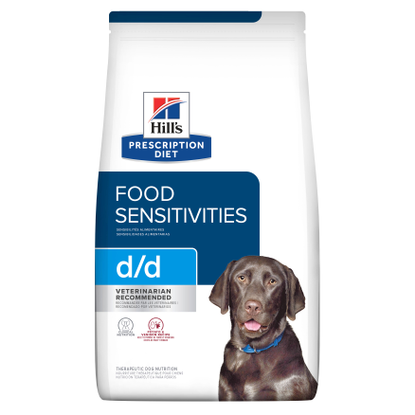
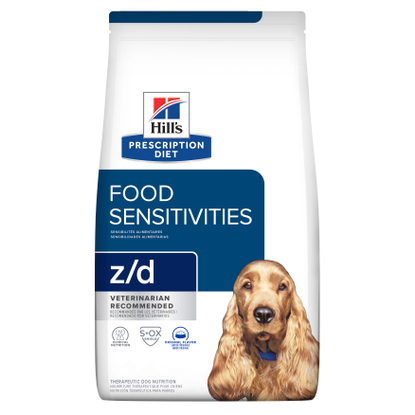
If your dog has scaly patches or flakiness on their skin and appears itchy or uncomfortable, understanding the cause is the first step in determining how to help a dog with dry skin.
Signs of Dry Skin in Dogs
There are a number of signs that a dog has dry skin, including:
- Flaky, scaly skin
- Dull, brittle hair coat that feels rough
- Red or inflamed skin
- Excessive shedding
- Hair loss
- Excessive licking or scratching
- Foul odor
“Pet parents should be on the lookout for symptoms of dry skin to help relieve their dog quickly from discomfort,” says Gary Dattner, DVM, chief veterinary officer for Tandem Vet Care. “If you notice your dog is itching frequently, has dandruff, flaking, or scabs, or a funky odor to their skin and coat, schedule an appointment with your veterinarian to come up with a diagnosis and [treatment] plan.”
What Causes Dry Skin in Dogs?

It will take some sleuthing to diagnose the cause of dry skin in dogs. Your veterinarian will do a thorough physical exam to assess your dog’s skin and coat and check for parasites. They will also ask questions about diet, lifestyle, overall health, and any changes to your dog’s behavior.
“Dry skin may be a symptom of a deeper issue, such as…endocrine diseases, nutritional imbalances, and infection,” says Antje Joslin, DVM, veterinarian consultant for Dogtopia. “Other symptoms that need to be addressed include lethargy, changes in energy, behavior, appetite, weight loss or gain, or any signs of infection.”
These are the most common causes of dry skin in dogs:
Allergies
Common dietary allergies or poor nutritional balance can cause dry skin on dogs, according to Dr. Dattner. Proteins like those from dairy, beef, chicken, eggs, soy, and wheat gluten are the most common food allergens for dogs.
When food allergies are the suspected cause of dog dry skin, your vet may recommend an elimination diet to see which ingredients may be causing allergic reactions. There is no best dog food for dry itchy skin, but the results of an elimination diet will help determine which ingredients to avoid, going forward.
Your veterinarian may suggest feeding a prescription diet formulated for dogs with food sensitivities. For example:
- Hill’s Prescription Diet d/d uses novel protein options (such as salmon or duck) and limited ingredients to help reduce the risk of triggering an allergic response.
- Hill’s Prescription Diet z/d is a hydrolyzed protein diet, meaning the proteins are broken down into smaller components that are less likely to be recognized by the immune system — making it a strong option for dogs with confirmed or suspected food allergies.


During the elimination trial, your dog will eat only the recommended prescription diet for six to eight weeks. After this period, your veterinarian may reintroduce the previous food to see if symptoms, such as dry or flaky skin, return. If they do, a food allergy is confirmed.
Parasites
Demodex mites, canine scabies, and fleas have a serious ick factor, and these creepy crawlies can also cause dry skin on dogs. Parasites cause your dog to scratch and bite at their skin, which can lead to inflammation and dry, flaky skin.
If your vet diagnoses your pet with an external parasite, they will provide treatment that will bring relief to dry skin. It’s also important to keep your dog on monthly preventative medications to control fleas and other parasites (and protect their skin)!
Improper grooming
It’s so important to groom your dog. Brushing their coats removes dead hair and helps distribute the oil across their skin, which can alleviate dry skin and reduce dandruff — but it’s important not to overdo it.
“Overbathing can lead to dry skin by stripping natural oils from the skin and disrupting its pH balance,” Joslin says. “This can disrupt the skin barrier, increase irritation, and potentially cause skin infections.”
Some dogs need to be bathed more often than others. Ask your vet for a recommendation based on your dog’s skin and coat and be sure to use shampoo created for dogs. Human shampoo can strip the oil from a dog’s coat and make dry skin worse.
Stress
Stress from the occasional thunderstorm or vet visit might not be the cause of dry skin. But “chronic stress can affect a dog’s hormone balance and immune function,” Dr. Joslin notes. “Changes in hormones or immune function can disrupt the skin barrier and lead to dry or infected skin that may trigger excessive licking, chewing, or scratching.”
Illness
There are systemic illnesses that can affect the skin, and sometimes dry skin is a symptom, Dr. Joslin says. She points to hypothyroidism, Cushing’s disease, and other autoimmune diseases that affect the skin as examples.
Weather changes
Just like cold temperatures and dry weather take a toll on your skin, it can make your dog’s skin dry and flaky. Running a humidifier in the winter is one way to add moisture to the air and combat the dryness caused by indoor heating.
Breed
Certain dog breeds are more prone to dry skin. “Hairless breeds, fast-growing large breeds, or breeds that require frequent grooming may be more prone to dry skin than others,” Dr. Dattner says.
Researchers at the Royal Veterinary College also found that flat-faced breeds, including French Bulldogs and Pugs, are at higher risk of a skin condition called skin fold dermatitis that can cause symptoms that include dry skin (1).
Dog Dry Skin Treatment: How to Help

Dry skin can make your dog itchy, smelly, and uncomfortable but there is no one-size-fits all cure for dry skin on dogs. Your vet can diagnose the cause, rule out an underlying illness that can cause dog dry skin patches, and recommend treatment to help them feel better.
“The treatment for dry skin usually includes diagnosing and addressing any underlying medical condition and treating it appropriately,” Dr. Joslin says.
When a dog has dry skin due to food allergies, an elimination diet and new allergen-free dog food will alleviate the symptoms. A dog with dry skin due to fleas needs medication to treat the parasites.
Your vet may recommend one (or more) of these treatments for dogs with dry skin:
- Parasite prevention and treatment
- Switching diets
- Omega-3 fatty acid supplements
- Medicated shampoos to alleviate dry skin and itchiness
- Prescription corticosteroid medications
- Antibiotics for bacterial infections
- Antifungal medications
- Dog skin moisturizer or mousse
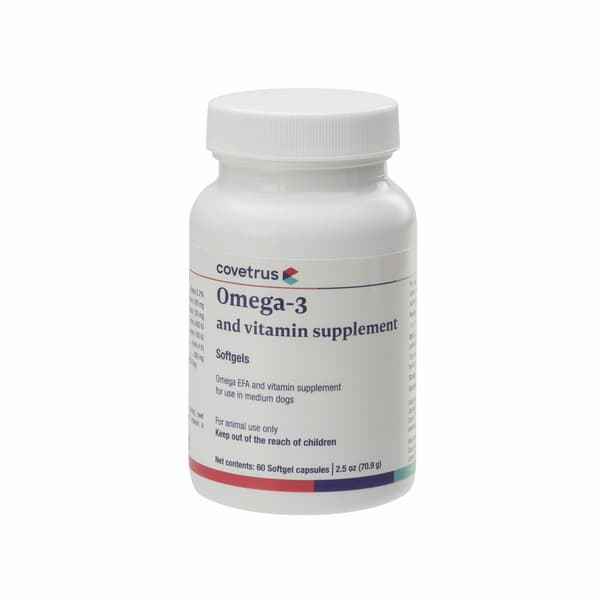

Dry skin may co-occur with other conditions that will need separate treatments. “If your pet has dry skin and has sores, scabs, open wounds, hair loss or bald patches with or without excessive licking, chewing or scratching, see your veterinarian,” Dr. Joslin advises.
Dogs and Dry Skin: Other Tips and Advice

Taking steps to prevent dry skin in dogs can protect your dog from the itching, scratching, discomfort, and potential infection that dry skin can cause.
Giving your dog year-round parasite protection, minimizing stress, using a humidifier, and bathing with a moisturizing shampoo designed for dogs can help prevent dry skin in dogs. Regular wellness checkups with your veterinarian are also essential to identify (and treat) any issues early. This will help ensure that your dog’s skin and coat stay in tip-top condition.
Reference
- Dan G. O’Neill, Dara Rowe, Dave C. Brodbelt, Camilla Pegram & Anke Hendricks (2022) “Ironing out the wrinkles and folds in the epidemiology of skin fold dermatitis in dog breeds in the UK”, Nature Scientific Reports

